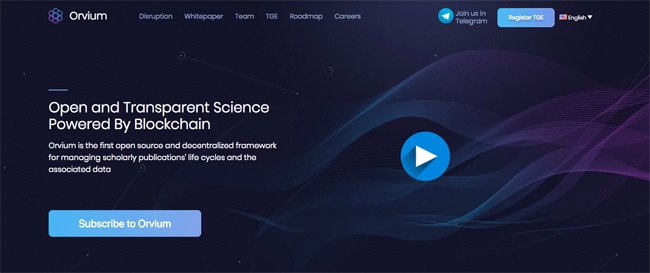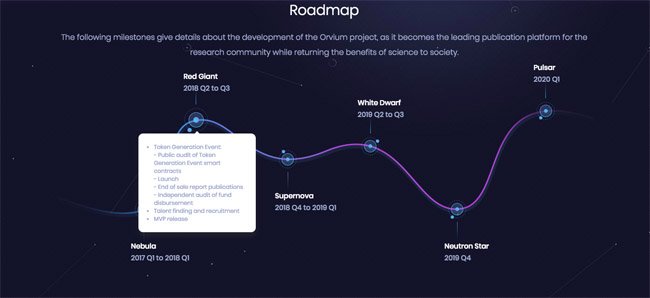Orvium is a project that seeks to bring an open sourced and decentralized hub for the publication and dissemination of scientific knowledge. If it is successful, it will become the first framework for scholarly publications that manage their lifecycles and associated data within a decentralized structure.
Simply put, Orvium will provide a haven for readers and academics alike by improving the space with various features and intended use cases.
It plans on achieving this by allowing for optimal publication costs, continuous validation of information and incorporating features to enable transparent peer review – all of which address the growing needs of this niche, especially in this day and age.
In addition to the aforementioned benefits, Orvium will also focus on reviewer recognition, sharing of scientific data, versioning support and a traceable lifecycle for pertinent publications.
Other features include but are not limited to the aspect of custom copyright, custom licenses, subscription freedom, zero delay publication, and decentralized journals.
A variety of these features are of significant importance in an era where information is key and access is hard to come by.
Orvium Review: Why Orvium Matters
The monetization of information is a major issue these days, news publications are placing pay walls preventing you from reading content, and even academic journal hubs such as JSTOR are providing selective access to their content.
Yet the need for information is as paramount as it was in the past – and some would argue that it is more so in the present day. After all, information helps us to improve our lives, it leads to innovation, and allows for growth and development in all aspects; all of which is integral to the survival of the human race and the planet itself in the fact of new illnesses and the pressing issue of global warming.
Thus, harnessing various types of information and keeping it bound or blocked can be a detriment for all.
But that is easier said than done.
In its current form, the scientific publication industry is in a very sad state. Well, for some of the parties involved.
The scientific publishing industry is a niche which has a lot of wealth that can be derived from it. It is not a metaphorical expression either, because in addition to the treasure of knowledge, a lot of actual money moves around in this industry.
There is one problem though, the money is concentrated in the hands of just a few players. And as with any other sector, the emergence of “a few players” usually indicates one key issue.
The rise of an oligopoly.
A few competitors in the space have a lot of control over the entire system. For instance, as of 2015, over 50% of the industry was controlled by about five for-profit publishers. And the situation has not changed much.
The control of these companies would not be that much of an issue if they made life easier for academics or even their readers, but that does not seem to be the case. Instead, they form several hurdles in the very process of publication itself. From the flaws in peer review mechanisms to uncalled for costs of publication even in the digital age, these publishers make the process of sharing one’s findings with the rest of the world and help them advance in their career to be a much more daunting experience than it should be in the first place.
While those issues pertain to the academics who develop these works, the song does not get to be any different when it comes to the readers as well. Just like academics themselves, readers have their own issues to face when it comes to accessing the published data, including but not limited to the most pressing one of them all: the cost to access it.
However, since the mentioned for-profit companies have a certain reach and grasp over the publication and dissemination networks, they can have more leverage and strength in how they dictate the norms of that industry. They can take the power away from the vast number of researchers and put in place onerous policies in regard to costs, opaqueness, and retention of ownership.
In addition to these issues, more often than not, the authors of these research papers are not recognized the way they deserve to be. They end up being faceless cogs in a much larger machine – even after readers pay a hefty sum to get access to their work.
And Orvium will exist to help unleash scientific information and open it up for all to access.
Orvium Review: How Does Orvium Work?
Built upon the Ethereum blockchain, the Orvium platform is supposed to be designed to work in a fair and transparent manner, creating a thriving marketplace.
The platform will utilize the technology of the blockchain to store revisions, submissions of publications, oracle actions, and reviews.
Their decentralized storage method will lead to a database that is open and accessible to people across the world. This type of storage will also allow for the recording of the publication process in a traceable and accountable manner with lesser costs.
Open source framework that is driven by the community will be key to opening up access and maintaining the widespread dissemination of the latest scientific knowledge.
The ability to have autonomous journals that are decentralized and distributed through set mechanisms without any companies or corporations controlling them will have a huge impact on the industry, but in a very positive manner.
Research data and process sharing is yet another feature that adds to the value proposition of the Orvium blockchain. By leveraging the power of an immutable ledger that shares data instantly across all parties, academics will be able to share their research process step by step with their readers, all while having the peace of mind that their findings remain intact and free from future alterations.
A collaborative framework will also ensure that readers could actually reach out to the academics or other readers like them to share their comments and questions in real time, which will open door to more innovations through the process of understanding and healthy inquisition.
Big Data and Artificial Intelligence integration are supposed to take scientific validity to a new level. Although it has great potential, this is a large claim and can only be confirmed once the project comes to tangible fruition.
The Orvium Initial Coin Offering Details
There will be a maximum of 379M Orvium (ORV) tokens that will be generated in the project’s ICO. The price of one ORV will be ten cents ($0.10).
Orvium will distribute 60% of its tokens in the token generation event; 10% of the tokens will go to the team, 10% of the tokens will go to advisors; and 20% of the tokens will go to the Orvium OU.
Orvium will accept Ethereum in their ICO.
The hard cap goal will be 20 million.
Interested parties will have to register via the Bitcoin Suisse system to participate in the token sale, where they will be going through a know your customer (KYC) process.
Where Does the ORV Token Come Into Play?
It will be the currency of exchange in the process of the lifecycle of manuscripts and journals. In addition to that, it will be used in manuscript submission, peer review, payments for copyright licenses, research data sharing, journal management and more.
To summarize, it will serve as the main method of transaction over the platform.
The parties who will be using the currency include but are not limited to authors, institutions, peer reviewers, readers, and journal owners.
Orvium Review: Roadmap
The project completed its prior stage and has now moved on to the next phase. It has named these phases rather interestingly, with the current state, called Red Giant, due to be completed in the third quarter of 2018.
In this phase, the Orvium team will focus on its token generation event (TGE), which will include the need for a public audit of its smart contract for the TGE. The team will have the launch of the TGE, the end of sale report publication and the independent audit of fund disbursement to ensure that everything goes smoothly for its investors.
Furthermore, during this phase, the team will be focusing on recruiting talent from the industry, deploying its initial product and proceeding to the next phase.
The team seems to be on par with its roadmap, but the lack of a specific TGE date is concerning. It has been noted that the event will start somewhere in September, but particular dates have not been shared by the platform as of yet.
Orvium Review: The Team
With that being said, the main team that is spearheaded by co-founders Manuel Martin, Antonio Romero, and Roberto Rabasco looks quite competent on paper, and the way the project’s whitepaper and the relevant documentation has been written adds to that notion.
Manuel Martin has had experience in the technology space. He has worked with CERN and companies such as Oracle, BMW, and UPS. He specializes in being a senior project leader in the various projects that he’s been a part of in the past. At Orvium, he serves as the Senior Project Leader and Blockchain Expert.
Antonio Romero has worked in the fields of big data and artificial intelligence with CERN. In the field of artificial intelligence, he has specifically worked in the aspect of machine learning. He has worked with other companies in these sectors as well. At Orvium, he runs the technical aspects of the project as its Big Data Engineer.
Whereas, Roberto Robasco boats an experience of over a decade, having worked for institutions such as Deutsche Telekom and Asos. His skills include the design and development of software solutions. At Orvium, he fulfills the responsibilities of being its Application and Cloud Technology Expert.
Orvium also have a large team of business advisors and scientific advisors to help in the respective aspects.
The team looks like it has its bases covered.
Orvium Review: Partners
Orvium has partnered with Bitcoin Suisse and other companies such as Amazix, Attella, Wachsman, and fusionico.pro.
Partners such as Bitcoin Suisse and Amazix provide the project and its ICO with a bit more credibility due to their stature in the community.
Orvium Review: Conclusion
The Orvium project has a great concept and a good team to back it up.
Access to the latest scientific research is needed and should be open to all to access. There shouldn’t be a significant barrier to access such information solely due to the aspects of profits.
The only major issue is the team’s lack of fame within the blockchain industry, but that seems to be the case with every other startup since most of these ventures are launching in a space that is new itself and only has a few entities with an established presence.
All in all, Orvium seems like a promising project. It just remains to be seen if it could now set very specific deadlines in the aspects where they are required the most, such as the token generation and subsequent sale.
If Orvium can do what it sets out to do it can bring about a significant improvement.

